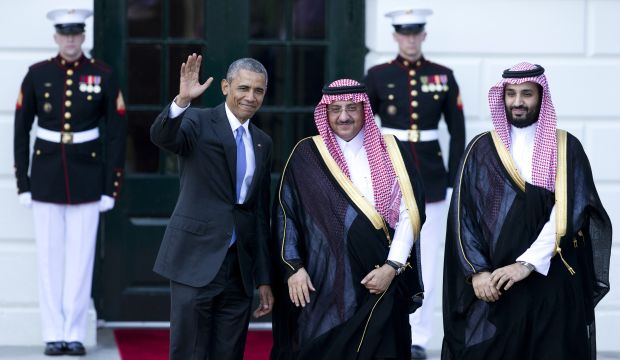
President Barack Obama (L) greets Saudi Arabia’s Deputy Prime Minister and Minister of the Interior, Crown Prince Mohammed Bin Naif (C), and Second Deputy Prime Minister and Minister of Defense, Deputy Crown Prince Mohammed Bin Salman (R), as they arrive at the South Lawn of the White House in Washington, DC, on May 13, 2015. (AP Photo/Manuel Balce Ceneta)
London, Asharq Al-Awsat—The ongoing Yemen crisis and the Iran nuclear deal will top the agenda at the US–Gulf Cooperation Council (GCC) summit being held at Camp David on Thursday, with President Barack Obama seeking to convince Gulf allies of Washington’s commitment to Middle East security.
Obama is set to meet with representatives from Saudi Arabia, Kuwait, Qatar, Bahrain, the UAE, and Oman to discuss US–GCC security cooperation, part of a wider US strategy to reassure GCC states regarding perceived rapprochement between Tehran and Washington.
Iran’s backing of Shi’ite Houthi rebels in Yemen has raised the state of alert across the region, while the US bid for a nuclear deal with Tehran has also raised concerns that Obama will seek to alleviate at Camp David.
In comments to Asharq Al-Awsat on Wednesday, President Obama acknowledged that GCC states are “right to be deeply concerned about Iran’s activities, especially its support for violent proxies inside the borders of other nations.”
However, Obama stressed that preventing Tehran from obtaining nuclear arms remains the main priority during the negotiations with Tehran, describing a nuclear-armed Iran as “one of the greatest threats to regional security.”
“It’s important to remember that Iran already engages in these activities without a nuclear arsenal. We can only imagine how Iran might become even more provocative if it were armed with a nuclear weapon. Moreover, it would become even harder for the international community to counter and deter Iran’s destabilizing behavior. That’s one of the reasons why the comprehensive deal we’re pursuing with Iran is so important,” Obama told Asharq Al-Awsat.
The US–GCC summit is being attended by senior officials and heads of state from the Gulf. The Saudi delegation is being led by Crown Prince Mohammed Bin Naif and Deputy Crown Prince Mohammed Bin Salman, after King Salman Bin Abdulaziz pulled out of the visit to concentrate on efforts to provide humanitarian support for the Yemeni people.
US President Obama praised the “extraordinary friendship” between Washington and Riyadh on Wednesday while meeting Saudi Arabia’s Crown Prince and Deputy Crown Prince at the White House.
“The United States and Saudi Arabia have an extraordinary friendship and relationship that dates back to President Franklin Roosevelt,” Obama said at the start of the meeting.
“We are continuing to build that relationship during a very challenging time,” he said.
The US president confirmed that the US–GCC talks would discuss building on the ceasefire in Yemen and working to establish “an inclusive, legitimate government” in Sana’a.
